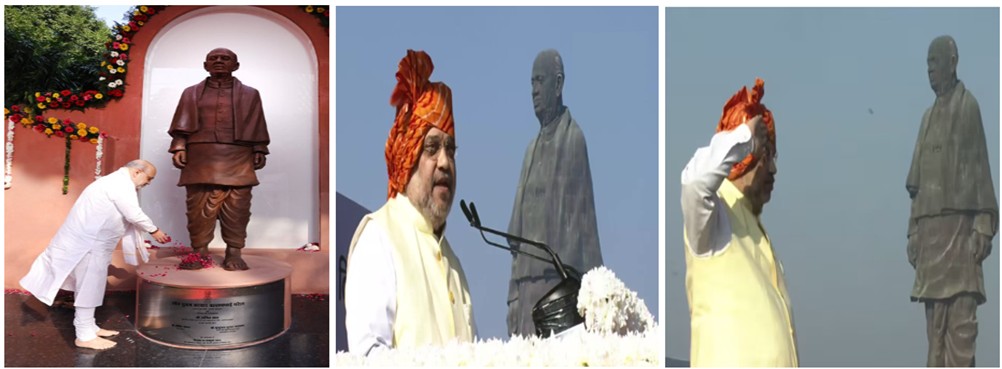In the pantheon of Indian statesmen, Sardar Vallabhbhai Patel holds a hallowed place as the Iron Man of India. His decisive role in integrating over 560 princely states into the Indian Union established his legacy as a unifier of the nation. Today, that mantle of steadfast leadership and unwavering commitment to national integrity finds a modern-day parallel in Amit Shah, the current Union Home Minister. From eliminating threats of terrorism to ensuring national unity, Shah’s contributions exemplify the resilience and dedication reminiscent of Sardar Patel. This editorial aims to draw a comprehensive comparison between these two stalwart leaders while underscoring why Amit Shah is often hailed as Bharat’s new Iron Man.
- Sardar Patel’s Legacy of Unity and Nation-Building
Sardar Patel’s leadership during the tumultuous years of post-independence India was characterized by his indomitable will and strategic diplomacy. The annexation of princely states like Hyderabad and Junagadh into the Indian Union through a combination of persuasion and force is a testament to his statesmanship. Patel’s vision of a united India laid the foundation of the modern republic.
Similarly, Amit Shah’s resolute actions in matters of national security and governance exhibit a parallel commitment to India’s unity. His instrumental role in the abrogation of Article 370 and the bifurcation of Jammu and Kashmir into Union Territories echoes Patel’s firm resolve in integrating princely states. By ensuring complete constitutional integration, Shah reaffirmed the government’s stand on national unity.
- Combating Terrorism and Ensuring Security
While Patel dealt with the complexities of internal dissent and external aggression during the nascent years of the republic, Amit Shah has faced the contemporary challenge of terrorism and insurgency. Under his leadership, India has witnessed a significant decline in terrorist activities. The robust implementation of anti-terror laws like the Unlawful Activities (Prevention) Act (UAPA) has empowered security agencies to act swiftly against terror networks.
Operation All-Out in Jammu and Kashmir, coordinated with the Armed Forces, has severely weakened terror outfits. Additionally, the successful dismantling of left-wing extremism in states like Chhattisgarh and Jharkhand further illustrates Shah’s relentless pursuit of internal security. His decisions echo Patel’s approach of prioritizing national security without compromising on democratic values.
- Strengthening Federalism and Administrative Efficiency
Sardar Patel’s role in establishing the Indian Administrative Service (IAS) was pivotal in maintaining administrative unity. His belief in a strong and efficient bureaucracy as the backbone of governance resonates in Amit Shah’s emphasis on cooperative federalism.
Shah has championed schemes that promote state-center collaboration, particularly in areas of law enforcement and disaster management. His leadership during the COVID-19 pandemic showcased effective coordination between state governments and central agencies, reflecting the spirit of Patel’s administrative philosophy.
- Decisive Leadership in Crisis Management
Patel’s handling of communal riots post-partition and his firm stance on maintaining law and order established his reputation as a decisive leader. Similarly, Amit Shah’s management of communal unrest and protests has demonstrated his resolve in upholding peace and security. His approach to the Delhi riots of 2020 and other sensitive situations underscored a firm, law-driven response.
The enactment of the Citizenship Amendment Act (CAA) is another instance where Shah exhibited his determination to implement policies aligned with the government’s vision, despite opposition. His clarity in communication and strong defense of national policies embody the qualities reminiscent of Patel’s fearless leadership.
- Promoting National Integration and Cultural Unity
Sardar Patel believed in fostering a sense of collective national identity, transcending regional and cultural differences. Amit Shah, too, has been a prominent advocate of initiatives that celebrate India’s cultural heritage. His support for preserving historical monuments, promoting regional languages, and commemorating national icons through projects like the Statue of Unity demonstrate his dedication to fostering unity through cultural pride. Moreover, Shah’s advocacy for the One Nation, One Election policy and the implementation of a uniform civil code are reflective of his vision for a more integrated and efficient governance model, akin to Patel’s administrative pragmatism.
- A Vision for the Future
While Patel laid the foundation of a unified India, Amit Shah is strengthening its pillars through robust internal security, legal reforms, and administrative efficiency. His leadership ensures that the principles of unity, security, and inclusive governance remain at the heart of India’s development trajectory. As the challenges of terrorism, separatism, and internal dissent evolve, Shah’s unwavering commitment to national interest, coupled with his strategic acumen, solidifies his stature as the new Iron Man of India.
Conclusion
Sardar Vallabhbhai Patel’s legacy as the Iron Man of India remains unparalleled. However, in Amit Shah, the nation finds a leader who mirrors Patel’s resoluteness in protecting the country’s unity and integrity. From combating terrorism to fostering federal cooperation, Shah’s contributions to national security and governance have left an indelible mark on modern India.
As history recognizes Patel as the architect of a unified India, it may well remember Amit Shah as the custodian of that unity—a leader whose steely determination and visionary leadership make him India’s new Iron Man.
(The views expressed are the author's own and do not necessarily reflect the position of the organisation)


